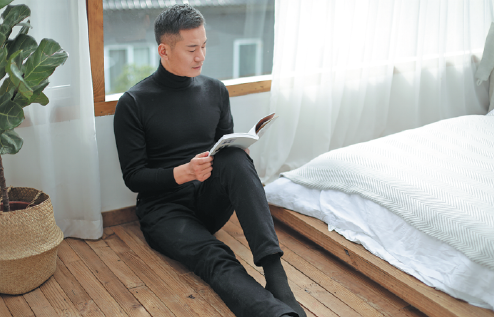The simple life
More people are getting rid of clutter and keeping purchases down to a bare minimum, Yang Feiyue reports.


Yang Zhihua, a minimalism consultant, reads a book at home in Beijing. CHINA DAILY
It may be an oxymoron but it still rings true, especially these days. More people are realizing the benefits of "less is more" after cutting their life down to the bare necessities.
Take Yang Zhihua for example. It used to be almost torturous for him to decide what he should wear before leaving his apartment.
"I didn't have a good physique, so I hoped to cover it up with clothes and make myself look better," says the Beijing resident in his early 40s.
When the clothes he bought failed to do the trick, he went looking for more that might.
"I suspected that, maybe the clothes I bought were not good enough, so I began to buy my way up to luxury items," he says.
The scales fell from Yang's eyes when he found that even those expensive clothes couldn't give him the image of himself he had in his mind.
To make things worse, they became a burden. He owned about 1,000 items of clothing at the peak of his spending spree.
Most of them ended up being buried in the deep recesses of his wardrobe.
"You don't want to wear a piece of clothing if it doesn't look good on you," Yang says. Worse still, they cluttered his living space, he adds.
That was when he started to do some soul-searching and decided on solving his image problem at the source.
"I started to work out and pay attention to what I ate based on relevant science," Yang says.
It took just several months before he saw an improvement in his body shape, and he was excited to see that anything, whatever it cost, looked nice on him.
The experience made Yang realize that freeing himself of his obsession toward clothes gave him more time to do things that are actually beneficial. It also motivated him to review his previous lifestyle.
Letting it go
Before 2012, Yang recalls, he had never thought twice about buying things he wanted.
It turned out to be double trouble.
"I couldn't save money and the things I bought became a burden," Yang says. "Moreover, it was spiritually painful when you went out of your way to impress people who just couldn't appreciate (your efforts)."
Seeing the error of his ways, Yang first dealt with his piled-up clothes.
He cut his items of clothing down to 20 for all four seasons, before moving onto his other belongings, including furniture.
He got rid of the old sofa, TV stand and bedstead, and brought in a table with wheels.
"My home was bigger and more comfortable, easier to clean with the robot vacuum," he says, adding that he could just move the mattress to do yoga in the living room, enjoy sunshine on the balcony in winter and avoid the summer heat in the shade with his movable table.
All of these practical benefits encouraged Yang to carry on the reductive lifestyle to achieve just the bare necessities and to live more simply.
He has confined phone use to one hour a day and never stockpiles food.
"There are too many things that compete for our attention. If we don't set boundaries, we will be very tired," Yang explains.




































